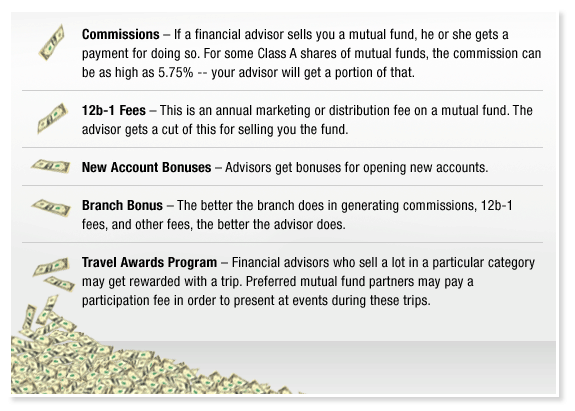It won’t cost you anything to work with me… and other half-truths told by commissioned based advisors.
"My Financial Planner Doesn't Charge me Anything."
I have heard this so many times it would be funny if it wasn’t so sad. One of the selling points that commissioned based financial planners tell their prospects is that they don’t have to pay anything to work with them. Sorry, but nobody works for free, and the notion that you can get sound objective financial advice for nothing is ridiculous.
Free Advice!
In this post I’ll explain how these types of advisors are paid, why this can be misleading and why it should be a big concern for anyone considering hiring a commission based broker/dealer.
How Are Commission Based Advisors Paid
The reason clients of commissioned advisors think that they don’t have to pay anything is because they don’t pay anything directly to the advisor. Instead, clients pay the insurance companies and mutual fund companies whose products are sold by the advisor. These costs are in the form of various sales-charges (loads), commissions, and ongoing management expenses. The financial companies then pay part of this to the advisor. The client never had to pull out a checkbook and never sees a bill so if the advisor doesn't explain these costs, they may go unnoticed.
Here is a little chart of how the money flows from you to the advisor.
In the investment world these commission based advisors are often called “Broker/Dealers.” Broker/Dealers are really just financial salesmen because their goal is to sell you products which in turn provide them with their sales commission checks. Edward Jones, one of the more prolific commissioned based advisors, has a forty three page document on how they are paid. (UPDATE: Edward Jones removed their forty three page fee document) but I found the new one increased to 54 pages only - Here.
(From the Fool.com Article Can Your Edward Jones Financial Advisor Really Serve Your Best Interests?)
The Conflict of Interest
The misleading way in which the clients are sold is not the even the biggest issue. The real problem arises with the conflict of interest that is associated with this type of pay structure. It incentivizes the advisor to push those financial products that generate the highest commission, which is not the best product for the client. This could also cause the advisor to “Churn” the account by placing unnecessary trades to generate more sales commissions. Commissioned brokers and advisors are legally allowed to put their interests first and yours second. They don’t have a "fiduciary duty" to you. This means that a commissioned salesperson will put you in a product that earns them a large commission but has also has large fees for you versus putting you in a product that pays them a smaller commission because it has much smaller management fees. They do what is in their best interest. The result is that you have less money because you get stuck in the option that has higher fees and larger commissions. If you work with a broker dealer and don’t believe this, check to see if they have sold you any loaded mutual funds (A, B, or C share classes). And then read this post on why loads are completely unnecessary.
England and Australia have already moved to outlaw financial commissions.
I would be remiss if I didn't disclose that I, as a fee-only financial advisor, have an interest in exposing the broker/dealer modeled as egregiously flawed. Regardless, the truth must be told.
I’ll close with a quote from Investopedia in their article on What is a Registered Investment Advisor:
“The old model of a broker calling his wealthy clients with stock ideas is dying. In fact, there has been a mass exodus of client assets leaving this model. There are several reasons for this change including very high commission fees (the big profit vehicle of the wire house firms at the time), and often inadequate diversification. Many of these brokers were not CFAs or MBAs, just glorified salesmen whose knowledge base was due more to happenstance than true education.”



